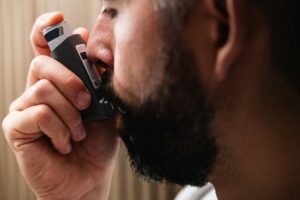The Health and Safety Executive (HSE) has launched a new targeted inspection initiative to tackle occupational asthma risks.
 Britain’s health and safety watchdog will carry out targeted inspections of 1,000 motor vehicle repair businesses across the nation to ensure they are properly managing the risks of occupational asthma.
Britain’s health and safety watchdog will carry out targeted inspections of 1,000 motor vehicle repair businesses across the nation to ensure they are properly managing the risks of occupational asthma.
The HSE explains that skilled vehicle paint sprayers are at risk of developing occupational asthma, which can be a life-changing and debilitating disease.
Isocyanate-containing paints can cause occupational asthma
 The use of isocyanate-containing paints and coatings in workplaces is the leading cause of occupational asthma in the UK.
The use of isocyanate-containing paints and coatings in workplaces is the leading cause of occupational asthma in the UK.
Isocyanate-containing materials are widely used because of their durability and finish quality. But, when they are sprayed, the paints release an invisible mist that spread rapidly and can reach dangerous, toxic levels very quickly.
For workers who develop the condition, even small amounts of isocyanate exposure can go on to trigger serious attacks. This means that, for many, continued work in the industry is impossible, and they are forced to permanently leave their profession.
Employers must prevent and control occupational asthma risks
This has prompted the HSE to launch its new inspection drive, which will see inspectors visiting vehicle repair businesses to assess their compliance with the Control of Substances Hazardous to Health (COSHH) Regulations.
 These regulations place responsibility on the employer for preventing or controlling worker exposure to isocyanates using effective control measures and safe working practices. They are also legally required to check these measures are effective by arranging regular health surveillance and biological monitoring to pick up any signs of occupational asthma in workers.
These regulations place responsibility on the employer for preventing or controlling worker exposure to isocyanates using effective control measures and safe working practices. They are also legally required to check these measures are effective by arranging regular health surveillance and biological monitoring to pick up any signs of occupational asthma in workers.
Health surveillance is a requirement in all workplaces where there is a risk of inhalation exposure and skin contact during paint spraying activities.
The practice involves regular medical screening by a competent occupational health professional to detect any early signs of related health conditions such as occupational asthma or dermatitis.
Currently, biological monitoring (urine testing) is the quickest, most practicable and cost-effective method to help businesses assess exposure levels and ensure that control measures remain effective. This can help to detect chemical isocyanate exposure before any health problems develop, helping employers act decisively to prevent disease.
Three essential protection measures to ensure compliance
There are three essential protection measures that employers can implement to minimise the risk posed by spray painting operations:
- Proper spray booth ventilation – maintain spray booths or rooms with adequate extraction systems that create negative pressure. This helps to prevent paint vapours escaping into the wider workplace spaces.
- Suitable respiratory protection equipment – Workers must use air-fed breathing apparatus certified to the appropriate standard. Filtering respirators do not provide enough protection against paint mist and vapours during spray operations. Breathing apparatus should ideally be full-visor type
- Safe clearance procedures– Display measurable clearance times clearly for all workers to see. Workers must not remove respiratory protection until they are safely outside the spray area, or the required clearance time has fully elapsed.
If HSE inspectors find that any businesses are breaching the COSHH Regulations they can issue improvement notices, prohibition notices or even prosecution, which can lead to unlimited fines.
The HSE provides comprehensive advice and guidance to help motor vehicle repair businesses ensure compliance with health and safety law and protect their employees from preventable occupational diseases, including occupational asthma.
Health and safety training and support
 First Response Training (FRT) is a leading, national training provider.
First Response Training (FRT) is a leading, national training provider.
They deliver over 6,000 courses each year in the fields of health and safety, first aid, fire safety, food safety, mental health, health and social care and other special focus topics.
Their diverse portfolio includes training awards in Handling Hazardous Substances (COSHH) and Managing and Supervising Risk.
A trainer from FRT explains:
“Exposure to harmful substances at work can have long lasting consequences, including the development of serious illnesses such as occupational asthma.
“It’s vitally important that all relevant businesses are aware of the risks of occupational asthma and other diseases and of the appropriate safety measures they must take to minimise the risks of exposure and protect themselves, their employees, colleagues, clients and members of the public from harm.”
For more information on the training that FRT can provide, please call them today on freephone 0800 310 2300 or send an e-mail to info@firstresponsetraining.com.
